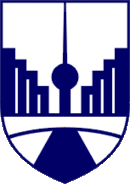Novo Sarajevo
Novo Sarajevo (Serbian Cyrillic: Ново Сарајево; pronounced [nôʋoː sǎrajeʋo], "New Sarajevo") is a municipality of the city of Sarajevo, Bosnia and Herzegovina.
Novo Sarajevo
Ново Сарајево New Sarajevo | |
|---|---|
 Bosmal City Center Towers in May 2010 | |
 Coat of arms | |
 Sarajevo City Location.png | |
| Country | |
| Communities | 18 |
| Government | |
| • Municipality president | Hasan Tanović (Ind.) |
| Area | |
| • Total | 9.9 km2 (3.8 sq mi) |
| Population (2013 census) | |
| • Total | 68,802 |
| • Density | 6,949.7/km2 (18,000/sq mi) |
| Time zone | UTC+1 (CET) |
| • Summer (DST) | UTC+2 (CEST) |
| Area code(s) | +387 33 |
| Website | http://www.novosarajevo.ba |
Neighborhoods
- Grbavica I
- Grbavica II
- Pofalići I
- Pofalići II
- Velešići
- Gornji Velešići
- Željeznička
- Dolac Malta
- Čengić Vila I
- Kvadrant
- Čengić Vila II
- Hrasno
- Hrasno Brdo
- Trg Heroja
- Kovačići
- Gornji Kovačići
- Vraca
History
Like Novi Grad, Novo Sarajevo is a product of the city's massive growth and development in the 1960s and 1970s. It is located in the middle of the Sarajevo field, predominantly on the northern bank of the Miljacka, between Novi Grad and Centar.
Prior to the siege, Novo Sarajevo had some 47.6 km² (41.6% Forest, 17.5% Meadows, 13.5% Commercial/Building Land, 10.4% Grass-land, 8.4% Ploghland, 13.5% Gardens). Following the Siege of Sarajevo, 75% of the lesser populated urban area was transferred to Republika Srpska (established as Istočno Novo Sarajevo), leaving Novo Sarajevo municipality with 11.43 km². As a result, Novo Sarajevo has the highest number of people per km², some 7524.
Economy

Novo Sarajevo is known as something of the commercial and business center of Sarajevo, housing many of the city's major companies and corporations such as Elektroprivreda Bosne i Hercegovine, the University of Sarajevo, UN house Bosnia and Herzegovina and also the HQ of Sparkasse Bank and the Raiffeisen Bank in Bosnia and Herzegovina.
Novo Sarajevo is considered to be the second most developed municipality in Federation of Bosnia and Herzegovina, boasting a per capita GDP of some 11,000 USD (275.2% of FBiH average GDP), just behind the municipality of Centar Sarajevo.[1] These two municipalities combine for 60.9% of the Sarajevo Canton GDP, even though they account for merely 3.5% of the total area of Sarajevo Canton, and 27% of its population.
Sites of interests
- Historical Museum of Bosnia and Herzegovina (Historijski Muzej Bosne i Hercegovine)
- Vilsonovo šetalište - popular promenade and recreation area (Wilson's Promenade)
- Suada and Olga bridge - bridge is a monument to Suada Dilberović and Olga Sučić, the first victims shot at the beginning of the Siege of Sarajevo.[2]
- Church of Sveto Preobraženje
- Hum Tower and Park Forest Hum - park and recreational zone
- Grbavica Stadium - (Stadium FK Željezničar)
- University of Sarajevo Campus
- Bosmal City Center
- ROBOT Shopping Centar Novo Sarajevo
- Konzum Family Centar Sarajevo (ex. Mercator)
- Embassy of the United States, Sarajevo
- Importanne centar Sarajevo
- Bus and Train station Sarajevo
- Old Jewish Cemetery Sarajevo
Demographics

1971
111,811 total
1991
95,089 total
- Bosniaks - 33,902 (35.7%)
- Serbs - 32,899 (34.6%)
- Yugoslavs - 15,580 (16.4%)
- Croats - 8,798 (9.3%)
- Others - 4,391 (4.6%)
2013
64,814 total[3]
- Bosniaks - 48,188 (74.34%)
- Croats - 4,639 (7.15%)
- Serbs - 3,402 (5.24%)
- Others - 8,585 (13.24%)
References
- "Socioeconomical data for 2014" (PDF). Federal Development Planning Institution, Federation of Bosnia and Herzegovina. Retrieved 3 March 2017.
- Schmidt, Bettina (2001) Anthropology of Violence and Conflict. Routledge, p. 221. ISBN 0415229057
- "Census of population, households and dwellings in Bosnia and Herzegovina, 2013: Final results" (PDF). Agency for Statistics of Bosnia and Herzegovina. June 2016. Archived from the original (PDF) on 24 December 2017. Retrieved 3 August 2016.
External links
| Wikimedia Commons has media related to Novo Sarajevo. |

